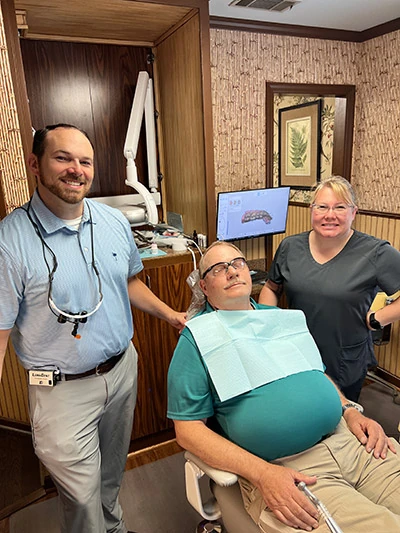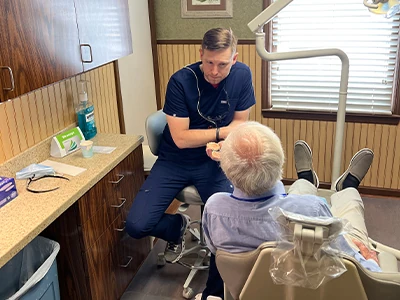For patients facing periodontal disease, Georgia Dental Studio offers top periodontal treatment in Jersey, GA, and beyond, using the latest dental technologies to deliver effective treatments for healthier gums. Dr. Albergotti and Dr. Till offer a selection of periodontal treatments, from deep cleanings to gum grafts and laser gingivectomies. When you care for your periodontal health, you're also caring for your total-body health!
What is Periodontal Disease?

Periodontal disease begins when the toxins found in accumulated plaque begin attacking the soft, gingival tissue surrounding the teeth. This bacterium embeds itself in the gum and rapidly breeds, causing a bacterial infection. As the infection progresses, it starts to burrow deeper into the tissue causing inflammation or irritation between the teeth and gums. The response of the body is to destroy the infected tissue, which is why the gums appear to recede.
The resulting pockets between the teeth deepen and, if no treatment is sought, the tissue within the jawbone may also recede, causing unstable teeth and eventual tooth loss.
What are the Risks of Periodontal Disease?
Periodontal disease is the number one reason for tooth loss. Research suggests that periodontal disease may also be linked to the development of other health conditions, including stroke, bacterial pneumonia, diabetes, cardiovascular disease, and increased risk during pregnancy.
Proper oral hygiene, a balanced diet, and regular dental visits can help reduce your risk of developing or aggravating periodontal disease.
The most common signs and symptoms of periodontal disease include:
- Bleeding gums
- Loose teeth, caused by bone loss or weakened periodontal fibers
- New spacing between teeth
- Persistent bad breath, caused by bacteria in the mouth
- Pus around the teeth and gums – Sign that there is an infection present.
- Receding gums, due to loss of gum around a tooth.
- Red, swollen or puffy gums
- Tenderness or discomfort due to plaque and calculus irritation
When Should I Visit a Periodontist?
A periodontist is a dentist specializing in the prevention, diagnosis and treatment of infections and diseases in the soft tissues surrounding the teeth, and the jawbone to which the teeth are anchored. Periodontists have to train an additional three years beyond the four years of regular dental school, and are familiar with the most advanced techniques necessary to treat periodontal disease and place dental implants.
If you experience any of these signs and symptoms, it's time to schedule a periodontal appointment:
- Bleeding while eating or brushing – Unexplained bleeding while consuming food or during the course of daily cleaning is one of the most common signs of periodontal infection.
- Bad breath – Continued halitosis (bad breath) which persists even when a rigorous oral hygiene program is in place, can be indicative of periodontitis, gingivitis or the beginnings of an infection in the gum tissues.
- Loose teeth and gum recession – Longer looking teeth can signal recession of the gums and bone loss due to periodontal disease. As this disease progresses and attacks the jawbone, (the anchor holding the teeth in place) the teeth may become loose or be lost altogether.
- Related health conditions – Heart disease, diabetes, osteopenia and osteoporosis are highly correlated with periodontitis and periodontal infections.
What Treatments are Available for Gum Disease?
Before your periodontal treatment begins, your dentist will extensively examine the gums, jawbone and general condition of the teeth. When gingivitis or periodontal disease is officially diagnosed, Georgia Dental Studio offers number of surgical and non-surgical options available to treat the underlying infection, halt the recession of the soft tissue, and restructure or replace teeth which may be missing.
We offer the following treatments for periodontal disease at Georgia Dental Studio:
Scaling & Root Planing (SRP)

Scaling is performed with dental instruments, such as an ultrasonic scaling tool that removes calculus and plaque from the surface of the crown and root surfaces. Often, the scaling tool can also deliver an antimicrobial agent below the gums that can help reduce oral bacteria.
Root Planing is a specific treatment which serves to remove cementum and surface dentin that is embedded with unwanted microorganisms, toxins and tartar. The root of the tooth is smoothed in order to promote good healing and prevent bacteria from easily colonizing in future.
Scaling and root planing can be used both as a preventive measure or as a stand-alone treatment for disease prevention, tooth prevention, banishing bad breath, and improving the appearance of the smile. SRP treatments are only performed after a thorough examination of the mouth. Your dentist will conduct x-rays, conduct visual examinations and make a diagnosis before recommending or beginning these procedures. Depending on the current condition of the gums, the amount of calculus (tartar) present, the depth of the pockets and the progression of the periodontitis, local anesthetic may be used.
Following these deep cleaning procedures, the gum pockets may be treated with antibiotics to soothe irritation and help the gum tissues to heal quickly. During your next periodontal visit, your dentist or hygienist will thoroughly examine the gums again to see how well the pockets have healed. If the gum pockets measure more than 3mm in depth, additional and more intensive treatments may be recommended.
Pocket Irrigation
Periodontal disease is a progressive condition which, if left untreated, can lead to gum inflammation, the recession of bone and gum tissue, and tooth loss. At Georgia Dental Studio, we offer periodontal treatment in the form of pocket irrigation, designed to cleanse plaque from the spaces between the teeth and under the gum line, in order to prevent the colonization of harmful oral bacteria.
Also known as oral irrigation, pocket irrigation is a versatile preventive treatment that may can banish plaque and debris, remove harmful materials, and prevent deep causes of bad breath. The tools used to perform pocket irrigation have a rounded tip, which eliminates the risk of tissue damage while cleaning under the gum line and flushing out bacteria, food particles and toxins. he side port opening facilitates extensive cleansing by flushing out bacteria, particles and toxins from below the gum line. Antimicrobial substances may also be used to further prevent and eliminate harmful bacteria.
Pocket irrigation is generally performed in combination with other dental treatments, such as professional dental cleaning, scaling and root planing (SRP) or pocket reduction surgery.
Antibiotic Treatment
Our dentists offer antibiotic treatments for periodontal disease, that can be used in combination with scaling and root planing, curettage, surgery, or as a stand-alone treatment to help reduce bacteria before and after many common periodontal procedures. Antibiotic treatments for periodontal disease may include oral forms and topical gels which are applied directly into the gum pockets.
Topical Gels and Strips
Topical gels and strips offered for periodontal disease provide direct delivery methods that are generally preferred over their oral counterparts and are extremely effective when used after scaling and root planing procedures. One of the most commonly used direct delivery antibiotics is Arestin®, a minocycline antibiotic comes in mini capsules that are delivered into the gums after scaling and root planing.
Noticeable periodontal improvements are usually seen after systemic or oral antibiotic treatment. At Georgia Dental Studio, we'll always take time to determine the best treatment route or medication for your needs. Our dentists will incorporate antibiotic treatments as necessary for the healing of your periodontal condition.
Soft Tissue Grafting
Soft tissue grafting is often necessary to combat gum recession. Periodontal disease, trauma, aging, over brushing, and poor tooth positioning are the leading causes of gum recession which, in severe cases, can lead to tooth-root exposure.
When the roots of the teeth become exposed, eating hot and cold foods can be uncomfortable, decay is more prevalent and the aesthetic appearance of the smile is altered. The main goal of soft tissue grafting is to either cover the exposed root or to thicken the existing gum tissue in order to halt further tissue loss.
Soft tissue grafting is an extremely versatile procedure that has many uses. Recent developments in dental technology and laser dentistry have made soft tissue grafting more predictable and less intrusive. The primary benefits of soft tissue grafting include:
- Increased comfort
- Decreased discomfort and sensitivity due to root exposure
- Improved smile aesthetics
- Reduced appearance of "gummy" or "toothy" smile
- Improved gum health
Schedule Your Periodontal Consultation
Have you been diagnosed with periodontal disease, or do you suspect you may be suffering from its symptoms? A periodontal consultation with our skilled team is the perfect first step to reviving your healthy gums. Call today to schedule your appointment!